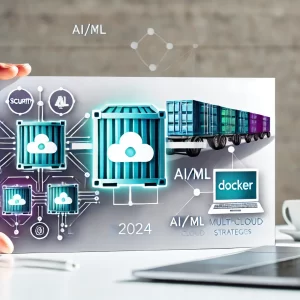The Role of Docker in Modern DevOps: Trends to Watch in 2024
In 2024, Docker continues to play a pivotal role in modern DevOps, driving innovations and setting trends that reshape how development and operations teams work together. This article delves into Docker’s influence on DevOps practices, the latest trends, and how you can leverage these advancements to optimize your workflows.
The Evolution of Docker in DevOps
Docker’s introduction revolutionized the software development landscape by making containerization accessible and scalable. Over the years, Docker has evolved from a tool for developers to a cornerstone of DevOps, enabling continuous integration and continuous deployment (CI/CD), automated testing, and scalable infrastructure management.
The Shift from Monolithic to Microservices Architectures
One of Docker’s most significant contributions to DevOps has been its facilitation of microservices architectures. Unlike monolithic applications, microservices break down functionality into smaller, independent services that can be developed, deployed, and scaled independently. This shift has led to:
- Faster development cycles due to isolated services.
- Easier troubleshooting as issues are contained within individual services.
- Scalable deployment where services can be scaled independently based on demand.
Docker’s Role in CI/CD Pipelines
Docker’s ability to create consistent environments from development to production has made it a critical component of CI/CD pipelines. In 2024, Docker continues to enhance CI/CD workflows by providing:
- Immutable infrastructure where the environment remains consistent across different stages.
- Automated testing by creating ephemeral containers for running tests in isolated environments.
- Efficient deployments through Docker images, reducing the risk of deployment failures due to environmental differences.
Key Trends in Docker for DevOps in 2024
As Docker continues to evolve, several key trends are emerging in 2024 that are shaping the future of DevOps:
1. Emphasis on Security in DevOps (DevSecOps)
Security is becoming an integral part of the DevOps process, giving rise to DevSecOps. Docker is at the forefront of this trend, with features like:
- Built-in image scanning to detect vulnerabilities before deployment.
- Enhanced access controls to manage permissions within Docker environments.
- Runtime security to monitor and protect containers during execution.
2. Integration with AI/ML Workflows
The integration of AI/ML in DevOps is becoming more prevalent, and Docker is adapting to meet these needs:
- Pre-built AI/ML images that streamline the setup of machine learning environments.
- GPU acceleration for faster model training and inference within containers.
- Seamless integration with popular AI/ML frameworks like TensorFlow and PyTorch.
3. Expansion of Multi-Cloud Strategies
In 2024, organizations are increasingly adopting multi-cloud strategies to avoid vendor lock-in and increase resilience. Docker supports this trend by enabling:
- Portable workloads that can run across different cloud environments without modification.
- Consistent deployment strategies across various cloud providers.
- Simplified multi-cloud management through orchestration tools like Docker Swarm and Kubernetes.
How to Implement Docker Trends in Your DevOps Workflow
To stay competitive, it’s essential to incorporate these Docker trends into your DevOps practices. Here are some strategies:
1. Adopting DevSecOps Practices
Implement security measures early in your DevOps process by using Docker’s image scanning tools and enforcing strict access controls. Best practices include:
- Regular image scanning for vulnerabilities.
- Implementing role-based access control (RBAC) to manage permissions.
- Monitoring container activities with runtime security tools.
2. Leveraging Docker for AI/ML
Streamline your AI/ML pipelines by utilizing Docker’s pre-built images and GPU support. Steps to follow:
- Use Dockerized AI/ML environments to standardize model development and deployment.
- Optimize resource usage with GPU-accelerated containers.
- Integrate Docker with CI/CD pipelines for automated model training and deployment.
3. Building a Multi-Cloud DevOps Strategy
Ensure your applications are cloud-agnostic by leveraging Docker’s portability features. Implementation tips:
- Create cloud-agnostic Docker images that can be deployed across different cloud providers.
- Use orchestration tools like Kubernetes to manage multi-cloud deployments.
- Implement consistent CI/CD pipelines across all cloud environments to streamline operations.
Key Takeaways
- Docker remains a key player in modern DevOps, facilitating faster development cycles, scalable deployments, and secure environments.
- DevSecOps is gaining traction with Docker’s enhanced security features.
- Docker is increasingly important in AI/ML workflows and multi-cloud strategies in 2024.
- Adopting these trends can lead to more efficient, secure, and scalable DevOps practices.
FAQ
What is Docker’s role in DevOps?
Docker enables consistent, scalable environments for developing, testing, and deploying applications, making it a crucial tool in modern DevOps workflows.
What trends are shaping Docker’s role in DevOps in 2024?
Key trends include the integration of security into DevOps (DevSecOps), the use of Docker in AI/ML workflows, and the expansion of multi-cloud strategies.
How can I secure my Docker containers in a DevOps environment?
Implement regular image scanning, use role-based access control (RBAC), and monitor containers with runtime security tools to enhance Docker container security.
What are the benefits of using Docker for AI/ML workflows?
Docker provides pre-built AI/ML images, GPU support, and seamless integration with CI/CD pipelines, making it easier to develop, train, and deploy machine learning models.
How can I implement a multi-cloud strategy using Docker?
Leverage Docker’s portability to create cloud-agnostic images and use orchestration tools like Kubernetes to manage deployments across multiple cloud environments.
Conclusion
Docker’s influence on modern DevOps continues to grow in 2024, with new trends and tools that make it indispensable for organizations aiming to optimize their development and operations processes. By staying informed about these trends and integrating them into your workflows, you can ensure your DevOps practices remain efficient, secure, and adaptable to future challenges.

